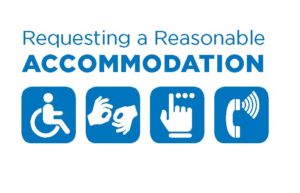During the course of their employment, individuals may present with physical or mental disabilities for which they are seeking a reasonable accommodation from their employer.
 This interactive process between employer and employee is complex and can expose employers to liability if they do not handle the requests appropriately, meaningfully engage in discussions with the employee and obtain pertinent information from the employee’s physician to determine whether the disability can be accommodated.
This interactive process between employer and employee is complex and can expose employers to liability if they do not handle the requests appropriately, meaningfully engage in discussions with the employee and obtain pertinent information from the employee’s physician to determine whether the disability can be accommodated.
Many companies formalize the reasonable accommodation process in their employee handbooks so employees understand how the process works and how accommodation decisions will be made.
Since part of the reasonable accommodation process involves a determination as to whether the employee can perform the essential functions of his or her position with or without a reasonable accommodation, it is imperative that employers have up-to-date job descriptions that clearly spell out any physical requirements.
Job descriptions should also reflect what is typically done in the position and not be filled with boilerplate statements of seldom performed tasks. Job descriptions should be reviewed on a yearly basis, and updated as appropriate.
Additionally, it is very important that the employer have an understanding as to limitations the employee may have, the expected duration of those limitations and what accommodation(s) may be recommended from a medical professional.
It is advisable to provide employees with reasonable accommodation questionnaire forms, along with a copy of their job description, to submit to their physicians.
Medical professionals can generally provide more objective information about the employee’s limitations and provide some recommendations for possible accommodations (i.e. weight lifting restriction, leave of absence).
Human resources can then evaluate the information that has been provided to determine what possible accommodation(s) can be made to assist the employee in performing the essential functions of his or her position.
Sometimes employees refuse to participate in this process or do not provide the requested information. Any lack of cooperation should be documented because failing to participate in the interactive process in good faith can result in the employer rightfully denying an accommodation to an employee.
It should be kept in mind that many positions in the bus and motorcoach industry are safety sensitive, particularly as they concern drivers.
Companies need to be familiar with the requirements of the federal commercial motor vehicle regulations and other state and local laws and how this may impact the reasonable accommodation analysis.
Employees should also be informed of the outcome of the interactive process and whether an accommodation can be offered.
However, if an accommodation is not to be offered to an employee after the interactive process is concluded, companies should make sure they have conducted a comprehensive and exhaustive analysis, which may include consulting resources such as the Job Accommodation Network (https://askjan.org/) and that they have documented every step of the process.
A reasonable accommodation may not be offered to the employee if it is determined that such an accommodation would pose an undue hardship to the employer or alternatively if the employee poses a direct threat to the safety of themselves or others.
Unfortunately, disability discrimination and failure to accommodate claims are very prevalent and many times are brought in conjunction with workers’ compensation and Family Medical Leave Act claims. Employers are well advised to proceed with caution in this area.
Caroline J. Berdzik is a partner with Goldberg Segalla LLP in Princeton, N.J. She devotes her practice to helping corporate clients navigate employment law issues from proactive counseling through dispute resolution and trial. Her clients include transportation companies. She can be reached at cberdzik@goldbergsegalla.com.




